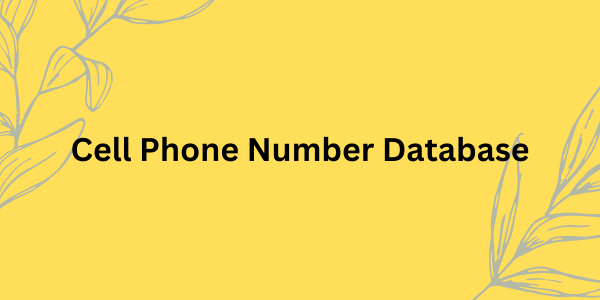Building a phone number database, particularly such a huge one as 3 million records, requires much consideration in a number of aspects. However, This overview will walk you through the key development, management, and uses of a Ghana phone number database.
1. Purpose of the Database
Understand what you want to achieve with
this database of phone numbers. Since the database may be for telemarketing, customer care, research, and outreach, enumerating the objective or purpose will help you guide how to collect and manage the data. For instance, businesses would wish Ghana Phone Number Database to reach customers for promotions. However, On the other hand, researchers may require data for demographic studies.
2. Collection of Data
The collection of phone numbers must be done
with respect to the local laws concerning data privacy. In Ghana, for example, the Data Protection Act, 2012, Act 843 stipulates that personal data shall be collected and processed lawfully. Following are techniques of data collection: Surveys and Questionnaires: Conduct surveys whose questions can yield contact information.
Public Records: Certain phone numbers
can be sourced from public records, such that it fits within the legal parameters of its use.
Social Media and Websites: Scrape data from users who voluntarily share their contact details.
Opt-in Lists: Request customers to disclose their contact information in exchange for information relevant to them and become subscribers to newsletters or any services.
3. Data Management
Scraped data needs to be handled through database management, which maintains continuity regarding its integrity and usability. However, This involves:
Cleaning: Run regular cleanups to eliminate duplicate, wrong, and invalid records for database accuracy.
Data Segmentation: Categorize
the data by demographics, interests, and purchase history to power effective communication significantly.
Secure Storage: Let the database be stored in a very secure place to France Phone Number Address avoid hacking and data breaches. However, Introduce encryption and put access controls in place to secure sensitive information.
With a systematically organized database
of phone numbers, the following applications can be utilized to their fullest effect:
Marketing Campaigns: Avail the database to send an SMS marketing campaign or call people for direct marketing purposes, making sure this is done within Ghanaian laws with regard to unsolicited messages.
Customer Engagement: Use the
database to call customers for their views and opinions, feedback, or even to inform them about any services and products.
Research Analysis: Researchers can use the captured data on phone numbers for demographic studies and market trends.
5. Legal and Ethical Considerations
When making use of the phone database, respective local laws should be considered for legal compliance or at least with ethical best practices:
Ensure that all numbers are freely given with consent to be used for their intended purpose.
Opting out: Give recipients a chance to opt out of communications easily. However, This will not only keep you in good books with regard to the law on this matter but also enhance your institutional reputation.
Transparency: At the time of collecting the phone numbers, clearly and concisely explain how the data will be used, and make sure promises are upheld.
6. Challenges
Some of the challenges in creating/maintaining the phone number database of 3 million records:
Data Accuracy: Difficulty in keeping updated records as numbers frequently change.
Compliance with Regulations: Legal complexities regarding protection of data/information about private individuals may require ongoing consultations with lawyers.
Technical Issues: An efficient database system that can deal with large volumes of data will need investment in technology, probably also in people with expertise.
Conclusion
Therefore, a Ghana phone number database of 3 million records offers excellent enterprise and researcher opportunities. However, the success in management and exploitation of the data squarely rests on issues of legal compliance, best ethical practices, and effective strategies for data management. In this regard, organizations that apply this database can work out better mechanisms of reaching out with due respect to individual privacy and their rights.


